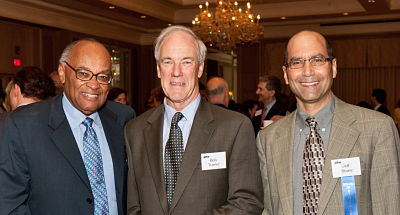Milton resident Bob Turner was recently honored at “Celebrating Pathblazers in Diversity,” an event sponsored by the Jewish Alliance for Law & Social Action. Mr. Turner is co-director of Commonwealth Compact, an employer-based initiative to increase racial and gender diversity at corporate and organizational leadership levels believing that diversity is vital to the region’s long term social and economic future. (Please see below for more on Commonwealth Compact).
In addition to Mr. Turner, attorneys Jody Newman and Kathy Weinman of the law firm of Dwyer & Collora for the diversity initiatives they advanced within the Women’s Bar Association and Boston Bar Association respectively. US District Court Judge Nancy Gertner was keynote speaker at the event.
On hand to celebrate Mr. Turner’s achievement was another Milton resident, Jeff Stone. Mr. Stone is a member of the executive committee of the Alliance.
About Commonwealth Compact
In 2007, a study by UMass-Boston showed that 94 percent of board members of the state’s largest corporate employers were white and about 87 percent were male. The findings were not unlike other disturbing studies of the lack of diversity in local power circles. This time, however, somebody decided to do something about it. In May 2008, Steve Crosby, dean of the McCormack Graduate School of Policy Studies at the University of Massachusetts Boston, convened an employer-based effort to increase racial and gender diversity at leadership levels that became known as Commonwealth Compact.
Crosby’s initial team included former Suffolk County District Attorney Ralph Martin, who is now managing partner of Bingham McCutchen, and Steve Ainsley, then-publisher of The Boston Globe. Milton resident Bob Turner, a former Boston Globe editor and columnist came on board shortly after, via a Globe-sponsored fellowship at UMass-Boston. He and Georgianna Melendez are now co-directors of the Compact.
Commonwealth Compact now counts dozens of the state’s most respected and influential civic and business visionaries on its Advisory Committee. Its goal is to make Massachusetts a desired destination for people of color, immigrants and women, in the knowledge that the contributions of all our diverse people will be vital to the region’s social and economic future. Commonwealth Compact recognizes that the history of Massachusetts demonstrates the economic and social benefits of diversity and that our state’s lingering reputation as an unwelcoming place for people of color must be turned completely around if we want to achieve our economic and social potential. To change that reputation – and the reality that too often still contributes to it – Commonwealth Compact encourages organizations to make significant progress by measuring themselves annually on a detailed series of Benchmark measures.
To date, almost 200 corporations, universities, and non-profit organizations have signed on. The Benchmark measures are specific and concentrate on six key areas of diversity: CEO Commitment; Boards/Governance; Workplace/Personnel; Customers/Consumers/Services; Suppliers/Vendors; Community Engagement. Each organization’s baseline and subsequent reports are kept strictly confidential and information is aggregated and analyzed annually.
The existence of Commonwealth Compact, the dozens of civic leaders behind it, and the signing on to the Benchmarks Initiative of approximately 200 organizations so far, including many of the state’s largest, are evidence that healthy and necessary changes have begun. “There’s an old saying, ‘That which gets measured, gets done,” said Ralph Martin. Reflecting the shared sentiment of his fellow Compact singers, Martin said, “We’re going to throw our lot in with each other and represent in a very transparent way whether or not our industries are making progress.” Additional Massachusetts employers are strongly encouraged to strengthen our civic culture and business competitiveness by signing on to the Compact.
